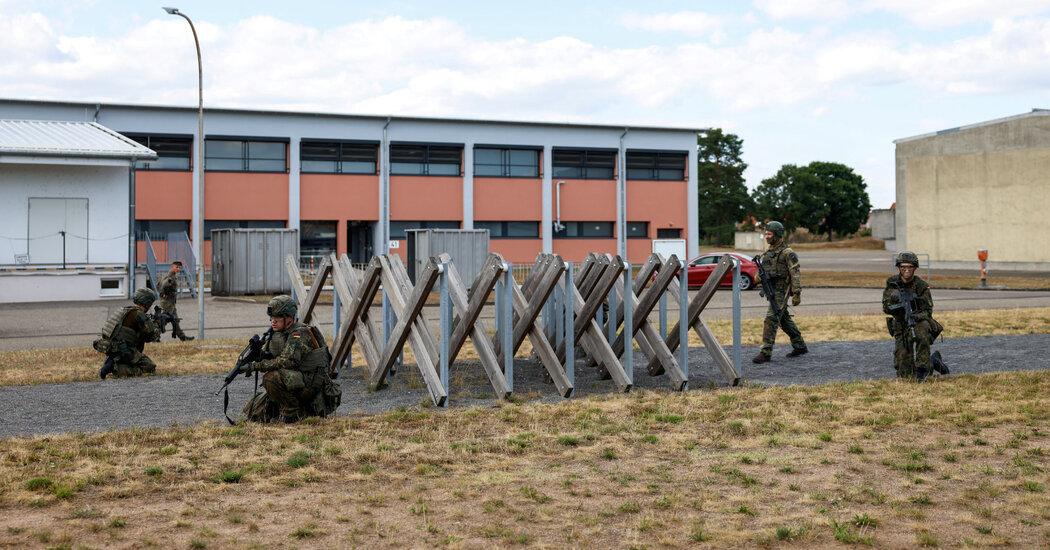The German government on Wednesday proposed the first major overhaul of its military recruitment since it abolished compulsory service in 2011, as the country seeks to fill the ranks of its woefully understaffed armed forces.
The proposed law, which must be passed by a majority in Parliament, is intended to promote voluntary recruitment but includes a measure to conscript young men if not enough can be persuaded to sign up.
It comes three and a half years after the former chancellor, Olaf Scholz. called for a “change of era” and promised to expand the military to meet the threat posed by Russia’s full-scale invasion of Ukraine in 2022.
The proposal is expected to lead to a major debate in Parliament. Even members of the governing coalition are split on the bill’s effectiveness and necessity.
The efforts to rebuild Germany’s military, which include record arms spending, have intensified this year as President Trump has made clear that he expects European nations to spend more on their own security.
Earlier this year, most NATO members in Europe committed to spending 5 percent of their gross domestic product on defense.
Germany’s new chancellor, Friedrich Merz, leader of the center-right Christian Democratic Union, changed his country’s Constitution to borrow more money for military spending. He has played a role in corralling other nations to match Germany’s effort and has repeatedly said that he wants Germany to have Europe’s biggest conventional army.
But armies need soldiers, and even as the threat from Russia has led to a slight uptick in recruitment, Germany needs an additional 80,000 active-duty service members. Many career soldiers who enlisted at the tail end of the Cold War are going into retirement.
According to the defense ministry, the goal is to have 260,000 service members and another 200,000 reservists; currently the armed forces have just over 180,000 active-duty members and fewer than 50,000 reservists who participated in training exercises last year.
To turn the tide on recruitment, Mr. Pistorius worked up the draft bill and presented it at a special session of Parliament held at the defense ministry.
The bill would raise soldiers’ salaries, expand specialized training and add attractive career prospects — reforms that the army hopes will persuade more young men to join. The bill would also create a mandatory questionnaire to be sent to all 18-year-old men (women can fill it out voluntarily), which the defense ministry will use to keep track of possible recruits and gauge their interest in the service.
Controversially, the bill allows the government to start conscription if not enough recruits can be enlisted voluntarily, though it leaves open the question of when and how that decision would be made.
Experts doubt that under the proposal the number of volunteers would significantly increase over what it has in recent years, and some criticized the lack of specificity about the point at which conscription would go into effect. Some said conscription was the only realistic option for expanding the force to meet the government’s goals.
“This model will not be sufficient to even come close to Merz’s confidently stated goal of becoming the strongest army in Europe,” said Karl-Theodor zu Guttenberg, a former Defense minister under whom conscription was suspended in July 2011.
Sören Neitze, a well-known military historian, and Henning Otte, the parliamentary commissioner for defense, wrote in an essay published in the Frankfurter Allgemeine Zeitung newspaper that the government was missing an opportunity. “Uncomfortable but necessary measures are being postponed,” they said.
Even a watered-down conscription measure is likely to be unpopular among young voters. A study on youth published earlier this year found that 69 percent of those between the ages of 15 and 25 would not want to defend their country with a weapon.
The political wrangling in Berlin over the bill began even before it was unveiled. On Monday the conservative foreign minister threatened to push the bill off the cabinet’s agenda, which would have delayed its rollout. That was only the start of what many predict will be contentious discussion in Parliament.
Norbert Röttgen, a lawmaker in Mr. Merz’s Christian Democratic Union and a foreign affairs expert, criticized the bill for lacking “any specification of figures and deadlines by which Germany must have achieved something.”
“This law is based on the principle of hope, and we can’t afford that anymore,” he said.
Philipp Türmer, who heads the youth wing of the progressive Social Democrats — part of Mr. Merz’s governing coalition — also criticized the proposal over the conscription option.
“You just have to try honestly with voluntary service,” he said.
Mr. Türmer said that the army remained too unattractive for many young people, and that he worried the Defense Ministry would ultimately go into a conscription model without bothering to improve offers to induce people join voluntarily.
“To use to full conscription right away, that’s a bit like cracking a hazelnut with a sledgehammer,” he said.
Planners at the Defense Ministry say that the volunteer-first model allows it to slowly build up recruitment infrastructure — including housing — that it has abandoned since conscription ended in 2011.
Christopher F. Schuetze is a reporter for The Times based in Berlin, covering politics, society and culture in Germany, Austria and Switzerland.
The post Germany Proposes Plan to Boost Recruitment or Resort to Draft appeared first on New York Times.




